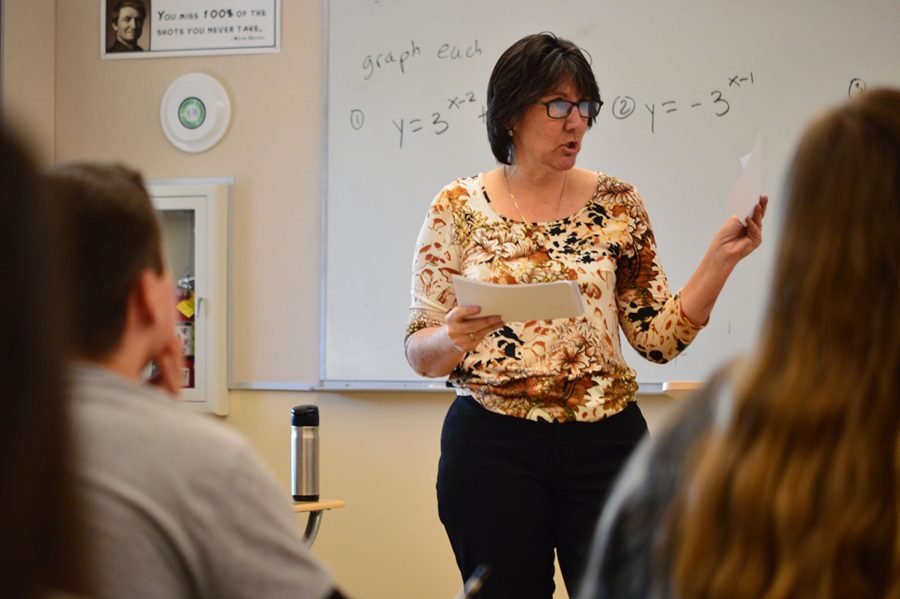Homework policy change in math department
Teachers hope change will increase student understanding of course through intermittent homework quizzes
Danielle Bisbee
Kathleen Bowers who teachers Alg2/TrigA hopes the new homework policy will increase student understanding of material.
Math teachers in Introduction to Analysis and Calculus and Algebra 2 and Trigonometry are implementing a new homework policy which replaces homework with periodic quizzes in order to increase mastery of material.
The policy, announced at the beginning of the second semester, substitutes homework with optional selected exercises and intermittent homework checks which students will take at the beginning of each period. Kathleen Bowers, who teaches math at Palo Alto High School sees flaws in the homework system of the past.
“For me the goal of my classes is mastery of the material,” Bowers, said. “For a while I have struggled with the value of going over homework in class and a lot of that time is spent with students frantically copying the problems from the board in order to earn full credit on the homework.”
Math teacher William Friebel parallels this statement, saying that teachers are transitioning from more of a points based system, where homework may be done hastily, or without full understanding of the content, to a more knowledge based approach.
“We really want students to know the skills that we teach day by day,” said Friebel. “This way it allows us to assess if students are on track and also encourages the students to really thoroughly learn the concepts the night before, because the next day they are required to demonstrate that knowledge.”
Each homework check will test knowledge learned in previous classes, and teachers hope that replacing homework with checks will allow students to be more prepared come test day and make sure students truly learn the content, not just go through the motions. Despite the removal of required homework, teachers are confident that this new system will have great benefits for students.
“I think that students will really like the immediate feedback and mastering the material in smaller chunks rather than putting in a big push right before the quiz or test,” Bowers said. “Learning is a two way street and the responsibility of both the student and the teacher and I think this approach really illustrates that partnership.”
Homework checks are worth five points each, the same as a regular homework assignment, and will go into homework category in the gradebook. Students will still have regular quizzes and tests. Students who do not get five points on a homework check can arrange to meet with teachers to retake during tutorial.
“We just give them a different version with different questions from the same topic and they can make it up, for up to full credit,” Friebel said. “We don’t want to restrict the points, if you are dedicated to learning the material fully, we want to be able to give you credit for that.”
When creating this new policy, teachers took into account student stress levels and student time constraints. One of the main goals of this system is to give students more control over their own course load, based on their own understanding of the material, while also closing the classroom achievement gap as a whole.
“It allows for flexibility on the students end to say well, if I’ve already mastered this particular skill, I don’t need to add more practice onto it, or if I haven’t yet mastered, I can add on more,” Friebel said. “So it allows for different learning speeds, and learning styles.”
For now, this policy is limited to Introduction to Analysis and Calculus and Algebra 2 Trigonometry. However, if students learn better with this model, then the policy will be up for discussion for possible expansion into other math courses.
Your donation will support the student journalists of Palo Alto High School's newspaper


